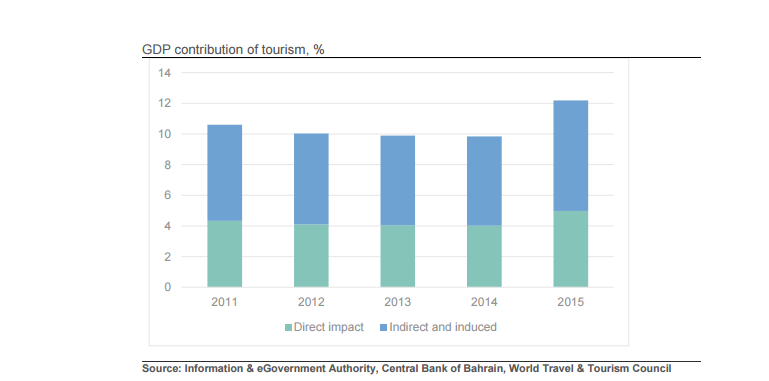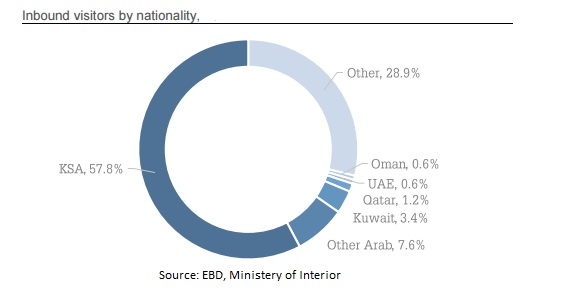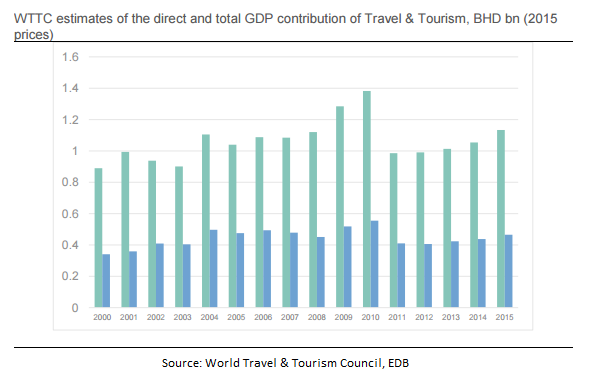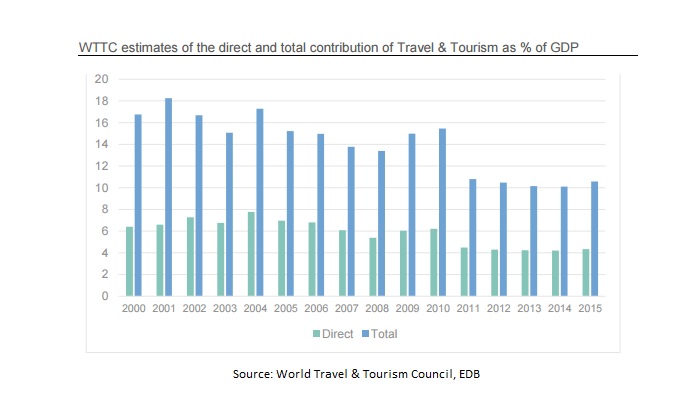Manama – Decypha: Bahrain had always been a place of interest for leisure and business tourists. This was evident in 1976 when British Airways decided that Concorde’s first commercial flight would go Bahrain. It was the first commercial supersonic trip in history. However, despite the positive propaganda depicting Bahrain as a tourist destination, successive Bahraini governments focused on increasing oil investments rather than promote tourism. Oil revenues currently account for 90 % of Bahrain’s revenue and 67 % of total exports. It is also among the biggest contributors to the economy, accounting for 20 % of Bahrain’s GDP.
Since mid-2014, as global oil prices slumped, the Bahraini government had been looking to once again to revive the country’s status as a major tourist destination as it looks to diversify its economy to improve government finances and sustain economic growth. The tourism sector was named by Jarmo Kotilaine, the Chief Economic Advisor of Bahrain’s Economic Development Board, a semi-autonomous government agency, as one of five pillars that would lead this diversification. “Tourism is also an interesting sector as it offers opportunities for entrepreneurship… and of course the country has some significant and unique assets because of its history and archaeology,” he said in March 2017 to Arabian Business. Accordingly, the Bahraini government has been leading touristic investments and setting favorable policies for private-sector investors. “Now tourism will be at the forefront of the Bahraini government vision.” said Jared Bachar, the executive director of Tourism and Leisure Investment in the Economic Development Board during an EDB meeting in July 2016.
A volatile sector
The latest figures show that tourists entering Bahrain had grown by 8.4% during the third quarter of 2016 compared to a year earlier. In August 2016, 1.4 million tourists visited Bahrain, according to data reported by Arabian Travel Market. Meanwhile, tourism directly accounted for 4.3 % of GDP in 2015, making BHD 465.1 million, according to government figures. Adding tourism’s feeding industries, the sector accounted for 10.6 % of GDP, recording BHD 1.113 billion in 2015, according to the World Travel and Tourism Council. The sector directly employed 31,500 people as of 2015, almost 4.2 % of labor force, according to a WTTC report. This makes tourism the fourth largest non-oil contributor to GDP in Bahrain, according to government figures.

However, when compared to 2010, the tourism sector is underperforming. At the time, tourism's direct revenue topped BHD 575 million. Adding feeding industries, the sector achieved almost BHD 1.4 billion. The main reason for the drop was the political instability during the 2011 Arab Spring which decreased tourism’s direct revenues to BHD 400 million and total (direct and indirect) revenue to just under BHD 1 billion. Tourists’ arrivals reflected the same trend, going from almost 12 million in 2010 to 6.73 million in 2011, but then increasing gradually to reach 11.6 million in 2015, according to the WTTC report. The sector's CAGR between 2000 and 2015 was 7.1%.
Tourism driving investments
The growing number of inbound tourists means growing related investments. Hotels and restaurants for example increased their contribution from 1.4 % of GDP in 2000 to 2.4 % in 2015, according to a WTTC report. The compound annual growth rate (CAGR) of the sector between 2000 and 2015 was 9.3 % with hotels growing at 7.2 % and restaurants by 12.3 % during those 15 years. Bahrain currently has 113 hotels as of 2015, 18 of which are five stars and 52 are four stars. High-end, luxury, hospitality investments are particularly active with globally-renowned chains including The Four Seasons and Ritz Carlton expanding in the country. There are currently around 12,600 hotel rooms in Bahrain and around 4180 in the pipeline, according to STR Global, a think tank, as reported by Travel and Tourism Gazette in March 2017. Occupancy rates have averaged 59 percent in 2015, according to government data reported by EDB. This is roughly the same as the average occupancy rate in 2014, but still remarkably down compared to 2010, when it averaged around 75%.

The independent restaurants business is harder to track. Research show that 100 restaurants are currently present in Bahrain, mainly located to in Block 338 in Adliya neighborhood and the Aali Boulevard, all high tourist and high-end neighborhoods. This is according to an EDB report published in June 2016.
Shopping malls are also booming, a result of the Bahraini government promoting shopping tourism. The major ones, such as the Aali Mall, Seef Mall and Bahrain City Center are directly connected to hotel accommodation. There is also the Bahrain Dragon City, a themed mega shopping complex. As it stands there are 30 shopping complexes in Bahrain, according to EDB. The next big complex will be the Avenues Mall, which should be opened in 2017.
To sustain this investment growth, the government has allocated BHD 105.3 million in 2015, which is around 5.3 % of the 2015 total investment budget, to upgrade tourism-related infrastructure. This budget should reach BHD 218 million, almost 8.6 % of the state’s investment budget, by 2026. Meanwhile, the Bahraini government has allocated a separate $1.1 billion budget to upgrade Bahrain’s main airport facility to increase its capacity from the current seven million visitors a year to 14 million. This upgrade should be completed by 2020. The government is also looking at further growing its cruise-ship tourism. During fiscal 2015/2016, the government received 32 cruise ships, with a combined passenger capacity of 68,000 passengers, according to government data.
Most of these investments are tailored to meet the demands of GCC residents as they comprise around 71.1 % of all tourists visiting Bahrain. The biggest visiting nationality is by-far the Saudis, accounting for 57.8 % of tourists. They are followed by Kuwait, Qatar, UAE and Oman. This is mainly because Bahrain is easily accessible by car, via the King Fahd Causeway, or plane. Meanwhile, its geographic location and extensive national airline global coverage makes it an attractive destination for transit travelers commuting between Asia and Africa or Europe. “We’re promoting both,” said Bahrain Tourism and Exhibition Authority chief executive Khaled Bin Humood Al-Khalifa to Travel Trade Gazzette in March 2017 referring to Bahrain becoming both, a preferred final and transit destination.

A money maker
For most Bahrain-based touristic companies profits have been increasing. A case in point is Gulf Hotels Group which during the third quarter of fiscal 2016 saw its revenue increase by 62% to almost BHD 2.9 million. Net profits also saw a massive 58.7% increase to BHD 12.35 million during the same time. Other companies making money include Bahrain Family Leisure Company, an entertainment-investment firm, which converted a BHD 761,484 loss during the fourth quarter of 2015 into a BHD 245,630 profit during the fourth quarter of 2016. Bahrain Car Parks Co., a parking-space construction company, saw its revenue shoot up to BHD 194,000 during the fourth quarter of 2016 compared to a loss of BHD 761,000 a year earlier.
On the flipside, several business were losing money. National Hotels, saw net profits decline by 6.9% during 2016 compared to 2015 despite a 4.6% increase in revenue during the last three months of 2016 reaching BHD 910,000. Bahrain Cinema reported a 40.1% drop in revenues during the last three months of 2016, compared to a year earlier, to record BHD 850,000. Bahrain Tourism Company, a hotel-investment firm, recorded a massive 81.7% drop in net profits during the fourth quarter of 2016 compared to the same period in 2015. This despite third quarter revenues increasing by 33.1% to record BHD 562,000.

Expanding Bahrain's appeal
To attract more tourists, the Bahraini government is focusing on raising global awareness of some of its historic relics, mainly by pursuing UNESCO recognition of its sites as well as offering more services and facilities at these destinations. Qal’at al-Bahrain—Ancient Harbour and Capital of Dilmun was on the UNESCO list of important historic locations since 2005. Pealing, Testimony of an Island Economy, which includes Souq al Qaisariya, was added in 2012. Both locations have seen upgrades to their visitor centers among other services.
More recently, the Bahraini government has been promoting events tourism, known as MICE (Meetings, incentives, conferences and exhibitions) tourism. It started with the Bahrain Grand Prix Formula 1 race in 2008. Last year it attracted 90,000 visitors. There is also the bi-annual Bahrain International Airshow taking place since 2010, the Spring of Culture annual music event and the shopping festival, which saw sales top $30 million last year. “The strategy is focused on the different layers of tourism including MICE,” said Al-Khalifa to Trade Arabia News Service in April 2017. “We are currently working on a project to develop a new convention and exhibition center in Sakhir along with other initiatives aimed at strengthening this sector.”
Meanwhile, the Dentist's Lifestyle Conference and Exhibition, are holding events to promote Bahrain as a medical and dental tourism destination. “Bahrain is the ideal destination for clients seeking cosmetic dental procedures... and there are numerous tourist attractions on offer to enjoy while they have their procedures,” said Mohamed Al Muharraqi, the Managing Director of Tarteeb who are organizing the event. Meanwhile Bahrain Tourism and Exhibitions Authority (BTEA) has launched the Handicrafts Training Program that aims to preserve the country’s traditional handcrafts, which are in high demand among tourists. The program has already graduated 70 Bahraini participants.
BTEA is also launching a marketing campaign in the UK to mark the opening of its representative office to attract UK tourists. The UK is currently the biggest non-Arab nationality that visits Bahrain with over 227,000 visitors in 2015. This is part of a global strategy that aims to increase the number of inbound tourists by 4 million to reach 15.8 million by 2018. By 2026, the government aims to increase direct tourism revenue to BHD 772 million, about 5.2 % of GDP. It also aims to increase direct and indirect tourism revenue by an average of 4.8% every year until 2026. Meanwhile, direct employment in the sector would increase by an average of 2.2 % a year to reach 42,000 by 2026. Direct and indirect employment opportunities would increase by 3.1 % to reach 112,000 jobs.

Not all smooth sailing
For new tourism investors, there will be challenges. Specific to tourism is that gambling is completely prohibited in Bahrain. Penalties range from three months to one year in prison for repeat offenses and establishments offering gambling services. Fines will be between BHD 300 to BHD 1000. Meanwhile, the government monitors the Internet, and blocks online gambling websites. Another limitation is that alcohol and live entertainment are only available in four and five star hotels.
There are also incumbent problems that plague businesses in general in Bahrain. Among the biggest is enforcing contracts where the country ranks 110 in the Doing Business Report 2017, down two places from 2016. Getting credit is also difficult despite seeing some improvements. Bahrain is ranked 101 compared to 109 a year earlier in the same report.
For observers, these challenges will not pose a major obstacle to attracting new touristic investments. They see that the country’s natural endowments and favorable policies coupled with government-led investments will be enough to make Bahrain an attractive tourist destination for both business and leisure visitors, and investors, bringing in much needed foreign currency. This growth in tourism will ultimately protect Bahrain from accumulating debt and ensure good economic growth rates for the economy to remain healthy. “We see tourism as a sector that has the potential to create high quality sustainable jobs for Bahrainis and to diversify our economy and export profile,” said Bachar of EDB.
By Tamer Mahfouz

